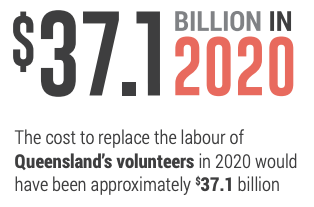Volunteering is time willingly given for the common good and without financial gain.
Volunteering Australia
This definition was developed to cover a range of activities that Australians take part in.
The definition was expanded upon in a series of explanatory notes.
What is volunteering?
Volunteering covers a wide diversity of activities in Australian society and can be:
- formal volunteering; within organisations (including institutions and agencies) in a structured way, or
- informal volunteering; acts that take place outside the context of a formal organisation.

While the vast majority of volunteering is undertaken by individuals, entities also donate employee time and this is included within this definition of volunteering.
Volunteering should not be exploitative or be used to replace paid employment.
While volunteering provides substantial benefits to society, importantly it also provides significant benefits to the volunteers themselves. The personal benefits of volunteering need to be recognised and fostered.
Volunteers give their time without receiving wages or salaries. However, Volunteering Australia lists a few cases where volunteers may receive money as part of their volunteering role:
- Volunteers can receive reimbursement of out-of-pocket expenses.
- Volunteers can be rewarded and recognised as part of good practice. While this process may introduce an element of financial or material benefit to the volunteer it does not exclude the activity from being considered volunteering.
- Volunteers may receive an honorarium, stipend or similar payment as recognition for voluntary services or professional services voluntarily rendered, in accordance with Australian Taxation Office rulings. Based on the nature of such payments and the recipient’s circumstances, the receipt of this type of payment does not preclude the person from being considered a volunteer. (Volunteering Australia)
This definition aligns with the United Nations view that volunteering ‘should be for the common good. It should directly or indirectly benefit people outside the family or household or else benefit a cause, even though the person volunteering normally benefits as well.’1 Volunteering is often considered as contributing to community wellbeing and volunteering activities cover all sectors of society, leisure and hobby areas and include, but are not limited to:
- Animal-related including animal welfare
- Arts/heritage/culture
- Business/professional/union
- Education and training
- Emergency services
- Environment
- Faith-based
- Health
- International aid/development
- Law/justice/political
- Parenting, children and youth
- Sport and physical recreation
- Welfare/community (Volunteering Australia
Volunteering should benefit society or contribute to the wellbeing of community members. Volunteers shouldn’t profit financially from their work, nor should the work of volunteers be exploited for private profit.
This definition is aligned to the current United Nations position on volunteering that states: ‘When people participate in peaceful activism, for or against animal research or building of a dam, both sides seek what they consider to be beneficial outcomes. They are included in our definition. Activities involving or inciting violence that harm society and actions not corresponding to the values attributed to volunteerism are not included in our definition’.1
Volunteering can include the concept of reciprocity such as participating in groups where a reciprocal exchange of help/services is undertaken for the benefit of others as well as the volunteer.
- United Nations (2011). State of the World’s Volunteerism Report, 2011: Universal Values for Global Well-being. United Nations Volunteers, P4.” (Volunteering Australia)
Volunteers can receive many benefits from their participation, including benefits that have financial value. For example: a volunteer may perform yard work for a local community group and receive membership in community activities in return. In this case, both services benefit the community, so this is a volunteer role.
Volunteering Australia does not expand upon the meaning of the phrase ‘time willingly given’ in the definition. However, the key theme is that volunteers perform their roles by choice.
Volunteers may choose to give their time for personal reasons, like making friends and gaining experience, or to contribute to a cause or movement greater than themselves. Volunteers are free to leave their role at any time, however they may continue volunteering as long as it aligns with their values, beliefs and ability to contribute.

Looking for the perfect role to match your skills, values and provide you with a meaningful experience?
We have thousands to choose from.
Explore volunteer rolesWhat is not volunteering?
The following areas are not considered to meet each of the core requirements of volunteering (‘without financial gain’, ‘willingly given’ and ‘for the common good’) and hence are not included in this definition of volunteering. It is acknowledged that many of these have a constructive, positive and vital role in society and may exist alongside volunteering and / or provide a pathway into volunteering. (Volunteering Australia)
Direct family responsibilities are excluded. It is recognised that direct familial relationships vary for different people and social groups and so this is open to individual interpretation. In addition, foster carers have many similarities with volunteers, but because of the family relationship, these are outside this definition of volunteering. (Volunteering Australia)
Everyone’s family is different, but in most cases, work done around the house is not included in the definition of volunteering. Examples of this type of work include doing domestic chores and caring for family members or other people in the same household. These activities are undertaken willingly and without financial reward, but they don’t directly benefit the broader community.
A number of programs are highly structured, with fixed requirements and provide options of volunteering type activities but with limited choice and/or varying types of in-built financial or reward outcomes. These vary widely and are excluded from this definition. Examples include:
- Compulsory educational service learning (where students are required to volunteer as part of a course)
- Mandated court orders including community service and fines
- Internships
- Formal work experience / vocational placements
- Mandatory government programs
- Limited choice labour market government programs (Volunteering Australia)
Internships, accredited training and work experience are not considered to be volunteering. This is because they directly advance financial and reward-based outcomes.
Volunteering requires a donation of time. Other types of donating such as giving money or materials and donating blood are not considered volunteering, although it is acknowledged there is a time element required in these forms of donating. (Volunteering Australia)
Donating money or supplies isn’t included in the definition of volunteering. Donations are made for the common good and without financial gain, but they don’t involve the donor giving a significant amount of their time. However, volunteers may also donate to the causes they volunteer for. Also, a volunteer may incur expenses in the course of their volunteering work, which is spent to benefit the community.
Working as a contractor or employee does not count as volunteering unless the company has donated the worker’s time to benefit the community. This is because employees and contractors are paid for their work: they work for financial gain. For more information on these distinctions, please refer to this guide by Justice Connect
Facts and figures
Characteristics of Volunteering in Queensland in 2020
- In 2020 there were more than three million volunteers in Queensland over the age of eighteen. That’s more than three quarters of the adult population. Or more than the population of Western Australia
- The people of Queensland donated more than 900 million hours of their time in 2020.
- On average in 2020, volunteers donated 24.9 hours per month, or 5.7 hours per week.

The economic value of volunteering
- In 2020, the value of volunteering to Queensland was almost $84 billion.
- The volunteering sector is around three times larger than the Queensland Government sector, and about the same size and the private sector.
- Volunteering provides a return on investment of approximately $4.10 for every dollar invested.
- The cost to replace the labour provided by volunteers in Queensland in 2020 was more than $37 billion.


Benefits of Volunteering
Volunteering is of great benefit to volunteers, volunteer-involving organisations and the community at large.
Benefits for volunteers
Volunteering is all about making a difference in your community; it also benefits you personally as it offers the chance to:
- act on your values, passions and interests
- make new friendships and create professional networks
- gain work experience and learn new skills
- enjoy new social and cultural experiences
- develop personally and build confidence
- enjoy better physical and mental health as studies show volunteering makes us healthier and happier
- challenge yourself in a supportive environment
- help your community
- have fun!
Benefits for volunteer-involving organisations
Many not-for-profits can be comprised entirely of volunteers, and many services wouldn’t be able to be provided if it wasn’t for the important, vital contribution they provide. Volunteer efforts help:
- enhance and extend the work of a cause
- improve the quality of life for clients and recipients of a service
- spread the word and increase awareness of important issues
- bring new insights, ideas and introduce new ways of working
- get people involved in meaningful work
- benefit the community at large
- change the world!

Find your ideal role, more to consider…
- Why do I want to volunteer?
- What opportunities are available?Is the organisation a non-profit or community project that works for the public good?
- Can I do what the role requires?
- Do the policies meet the requirements of the National Standards for Volunteer Involvement?
- Will I receive training and orientation?
- What are my rights and responsibilities as a volunteer ?
- How will the organisation provide me with documentation to help me understand these?
- Is there a volunteer manager or contact person to support and supervise me?
- Will I be reimbursed for money I spend while volunteering?
- Will I be given a written reference to help me apply for jobs in the future?
- Does the organisation have personal accident and public liability insurance (link to Insurance page) for volunteers?
Rights & responsibilities
You and the organisation you volunteer with are responsible for making sure you’re safe & happy in your role
Volunteers have the right to:
- be interviewed and engaged as a volunteer in accordance with equal opportunity and anti-discrimination legislation
- receive information about the organisation
- a clearly written role description
- know to whom they are accountable
- be recognised as a valued team member
- be supported and supervised
- a healthy and safe working environment
- be protected by appropriate insurance.
- say no if they feel they are being exploited
- be reimbursed for approved out-of-pocket expenses
- be advised of the travel reimbursement policy
- be informed and consulted on matters which directly or indirectly affect them and their work
- be made aware of the grievance procedure
- orientation and training
- information about policies and procedures that affect their work
- have their confidential and personal information dealt with in accordance with the Privacy Act 1988 (Cth).
Volunteers have a responsibility to:
- be reliable
- respect confidentiality
- carry out the tasks defined in the role description
- be accountable
- be committed to the organisation
- undertake training as requested
- ask for support when they need it
- give notice before they leave
- value and support other team members
- carry out the work they have agreed to do responsibly and ethically
- notify the organisation as soon as possible of absences
- adhere to policies and procedures.
Background checks
Volunteer-involving organisations have a duty of care to ensure a safe environment for employees, volunteers & clients.
Why do I need a background check?
Volunteer-involving organisations (VIOs) have legal obligations to protect the health and safety of their service users, visitors, volunteers and members of the public. These are especially important when working with vulnerable people such as children, older people and people with disabilities protecting them from harm or abuse.
To manage risks VIOs may establish or undertake:
- criminal history checks (police checks, blue cards, yellow cards)
- requirement for statutory declarations from volunteers
- referee checks
- policies and procedures
- supervision
- training
- following codes of conduct, or
- up to date Insurance policies.
Background checks required for volunteers may vary depending the services the VIO provides and the type of work a volunteer is required to undertake. Background checks should be completed by the VIO prior to the volunteer commencing.
Cost $48.90*
It is a requirement of all volunteer-involving organisations that work with the elderly to provide a national police certificate for volunteers and employees who have contact with clients and in some cases, all volunteers and employees must undergo one.
For a VIO to conduct national police check, the volunteer is required to complete a form, provide proof if identification and consent to the police check. National police certificates, issued within a few days, outline pending charges and unspent convictions, or findings of guilt. Spent convictions may also be included if a VIO has an exemption to request them. The certificates only show past criminal history, so a new certificate is required every three years at a minimum.
In some circumstances, such as if you have lived overseas since turning 16 years of age, you may also need to complete a Statutory Declaration stating you do not have an overseas criminal history. A Statutory Declaration is a form that must be witnessed by a Justice of the Peace or Commissioner for Declaration and is a legal promise, similar to taking an oath as a witness in court. It is a criminal offence to make a false Statutory Declaration.
For more information on police checks see the police certificate guidelines for the Federal Department of Health.
*Members of Volunteering Queensland are eligible for discounted police checks (link to Membership benefits) for volunteers and staff.
Cost $0 for volunteers
A blue card is required in Queensland to volunteer with an organisation that works with children.* The blue card screening conducts a working with children criminal history check, specifically looking at charges and spent convictions of offences that may pose a threat to children.
Blue cards are generally approved within six weeks, except when additional information is requested.*
It is a requirement of holding a blue card that you register your involvement with the volunteer-involving organisation you are engaged by so they are informed of changes in your criminal history.
A blue card can only be applied for once your volunteer-involving organisation requests that you complete a blue card application form and provide supporting documentation. The VIO will lodge the application on your behalf. If you already have a blue card your VIO can confirm that it is current, to do this, you will be asked to complete an authorisation form to link the VIO.
Blue cards must be renewed every three years. Renewals should be lodged four weeks prior to expiry and new authority to link a card holder to new organisations are required each time.
Volunteers are responsible for informing Blue Card Services and linked organisations of relevant changes to ther criminal history or contact details.
For more information regarding Blue Cards, contact Blue Card Services on 1800 113 611.
*Volunteers may be exempt from applying for a Blue Card if they have are a serving Police Officer or have a current Teacher Registration.
** It is an offence to apply for a blue card if you are disqualified or otherwise ineligible.
Cost $0
If you volunteer with adults with a disability in Queensland for an organisation funded by NDIS or the Department of Seniors, Disability, Services and Aboriginal and Torres Strait Islander Partnerships, you will need to apply for a Yellow Card (through your organisation), which conducts a criminal history screening similar to the Blue Card process. Like the Blue Card, the Yellow Card is also free for volunteers and must be received prior to commencement of the volunteer role. If you have a current Blue Card, you do not need to apply for a Yellow Card, but will need to complete an application for an exemption notice.
For more information, see the Department of Seniors, Disability, Services and Aboriginal and Torres Strait Islander Partnerships website.
Fee $159.50 (for one year)
Organisations engaging volunteer drivers who are providing public passenger transport service are required to ensure their drivers obtain the appropriate driver authorisation. The authorisation includes a criminal and traffic history checks, and require the volunteer to obtain a medical certificate demonstrating they are fit to drive.
For more information about these requirements, see the Department of Transport and Main Roads website.
Volunteers who are only using the authorisation as part of their volunteering duties, should request that the VIO covers the cost.
This information is intended as a guide only and should not replace professional legal advice. Readers are encouraged to contact the relevant authorities for more detailed advice relating to their personal circumstances.







